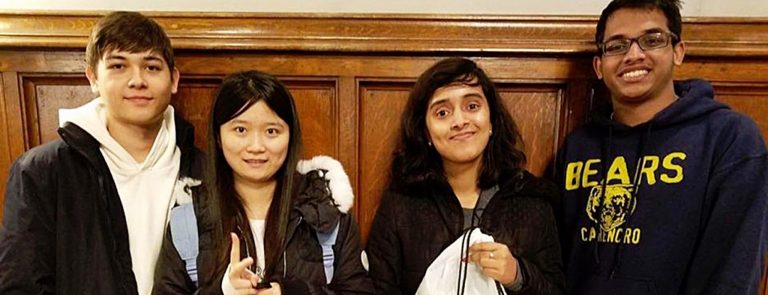
While the prevalence of fake news across social media and search engine results have been making headlines, a team of university students recently created a browser extension to help overcome the problem.
Last month, a group comprising four graduate and undergraduate students put together “FiB”, an extension for the Google Chrome browser that checks the authenticity of posts on Facebook in an attempt to fight against the spread of false or misleading news.
What’s even more amazing is the fact that Nabanita De, a second-year master’s student at the University of Massachusetts in Amherst; Anant Goel, a freshman at Purdue University; and Mark Craft and Qinglin Chen, sophomores at the University of Illinois at Urbana-Champaign, managed to build a prototype of the extension in less than 36 hours while taking part in a hackathon at Princeton University in New Jersey.
FiB went on to win the “Best Moonshot” award from Google, which went to the most ambitious project.
Students create brilliant extension that identifies fake news https://t.co/vTfv6RSkhw
— HP LatinoVoices (@LatinoVoices) December 12, 2016
What the extension does is tag links that appear in your Facebook feed as verified or not verified, taking into account factors such as the credibility of the source, keywords used in the article, and cross-checking the content with other news sources.
If a post doesn’t pass the test, the plug-in will provide a summary of more credible information on the topic.
The extension isn’t officially available to the public yet, as they’re tweaking it to be able to serve more users – the students have since released it as an “open-source project”, asking anyone with experience in developing extensions to help them improve it.
However, they do plan to release it by early January next year, reported the Huffington Post.
Could this browser extension be the answer to fighting fake news? https://t.co/nuxXoq3hiR pic.twitter.com/GMaT3x4T7o
— NBC News (@NBCNews) December 2, 2016
Speaking to NBC News, De, one of the team members, said: “People don’t always have the knowledge to tell what’s fake and what’s not.”
“People in Facebook are so vulnerable along with their [confirmation] bias, they tend to give in to whatever they see because often the links and content on Facebook seem very believable,” she told Chicago Inno via email. “We want to change that.”
“We wanted to create a proof of concept that the issue of fake news in social media can be tackled at a large scale,” added Goel, another team member.
Facebook and Google were among the sponsors of the hackathon, but according to the team, neither company have approached them regarding the extension, despite both companies reassuring the public that they would take steps to address the issues surrounding fake news.
Image via Anant Goel
Liked this? Then you’ll love these…
The proliferation of fake, misleading news is why students must learn media literacy
Academics use #trollprofwatchlist hashtag to ridicule U.S. watchlist of ‘liberal’ professors







